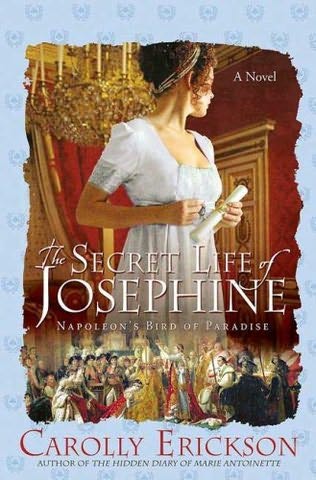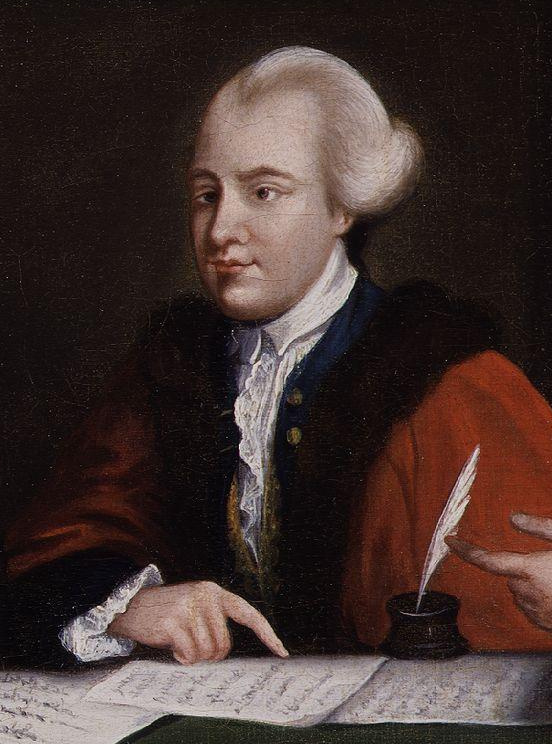
The Amateur Historian picked up a novel entitled
The Secret Life of Josephine: Napoleon's Bird of Paradise from her local library, which was just the beginning of her intellectual torture
."Hunh," said the Amateur Historian to herself. "The author seems familiar. Maybe I've liked her previous stuff? I'll check it out."
Unfortunately, the Amateur Historian was familiar with the author because she wrote, without doubt, the worst book I have ever read, the godawful excuse for a novel, The Hidden Diary of Marie Antoinette, which, upon reflection, deserves every nasty thing the Amateur Historian is insinutating.
Truth is, according to Kierkegaard, subjective, so someone may find redeeming features in
The Hidden Diary of Marie Antoinette. The Amateur Historian does not.
Erickson prides herself on writing something called, "historical entertainment", which is neither historical nor entertaining. In these sad excuses for works of even dubious literary merit, Carolly Erickson picks a famous female historical figure, preferably one with a crown, and invents a really boring and simplistic world in which a simplified-to-the-point-of-inanity version of said historical figure makes the readers wish for the protagonist's painful demise with every page.
The Amateur Historian is a huge fan of the Empress Josephine and has read some marvelous historical fantasies about Josephine wherein the author actually does research, effectively simplifies the historical event to narrative form while keeping most of its complexity and presents a sympathetic but flawed character whose motives are understandable and who seems a genuine part of their society. Those books were the
Josephine B trilogy by the marvelous Sandra Gulland.
It was not this wretched excuse for fiction by Erickson, which ought to have been named Josephine's Dear Penthouse Letter: A Bizarre Metaphor That Does Not Even Appear in the Text.
This book, though I hesitate to call it a book since it failed so much at being part of any genre but that of Gross Stupidity, has little to no relationship with historical fact, except that it appears Erickson once-upon-a-time read a general life-and-times biography of Josephine and decided that the characters were too complex and the time period too interesting and, furthermore, that the mentions of Josephine's love affairs weren't explicit and annoying enough.
Thus, this travesty of a novel was vomited forth into hardback.
I cannot begin to say how truly awful this book was. I hated it. I hated every historical inaccuracy, I hated every character Erickson introduced and I hated the fact that an intelligent, politically astute, clever woman was reduced to Miss Look-Who-I-Slept-With (which is apparently most of Europe). There was so much more to Josephine than the fact that she had sex! Unfortunately, Erickson either doesn't believe so, or feels that a complex emotional, spiritual and/or intellectual inner life makes for boring reading. Ditto with historical fact. Who cares how Napoleon's Grande Armee, the largest military force Europe had ever seen, met with disaster in Russia if there isn't sex involved?
And then, there is her godawful Napoleon. This is a man who is still revered as a hero, who inspired the poorest, worst-supplied army in Europe to capture Italy from the supposedly unbeatable Austrian forces, who created an entire legal system, who seized control of France when he was only thirty and whose army was so devoted they turned on Louis XVIII to support Napoleon at Waterloo. You'd be surprised by that if your only knowledge of the Napoleonic era came from this awful excuse for historical fiction. Napoleon is truly hateful and amazingly stupid. Though he hates Josephine (this from a man who, according to his generals, worshiped his wife, and whose existing letters to her are embarrassingly explicit) and grows to loathe her over the course of the novel, he bows to her every whim. God alone knows why, since this Josephine was one of the most unappealing characters I've had the misfortune to read. She is flat, one-dimensional, boring, and so annoying I still had no sympathy for her aafter the author attempted to force the readers to like Josephine by having someone rape the future Empress (which is just one of many "what the hell?" moments for anyone with a passing acquaintance with the historical time period or personnages).
I would like to give this novel a negative grade for not only failing to be even accidentally historically accurate, but also failing to have any of the conventional traits of fiction, like, well-rounded, interesting characters, a compelling plot, useful dialogue, wit, intelligence or proof of the author's basic literacy. What was the point of writing a prologue displaying that she had, in fact, done research, when absolutely none of it made it into the book?
There is nothing redeeming about this novel. If you can find it, Gentle Readers, pray inform me. I gave up when Josephine decided to travel to Russia after Napoleon.
... on second thought, that would mean forcing my Gentle Readers to expose themselves to such radioactive garbage. Forget the existance of this book. It will be better for everyone involved. I am personally attempting to find brain bleach to forget I ever wasted my time on something so hopelessly
bad.







